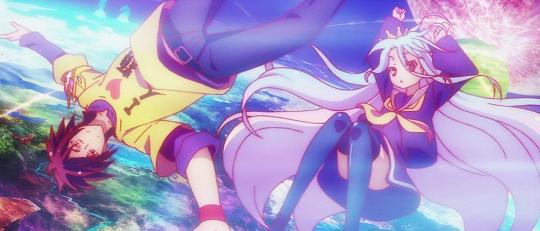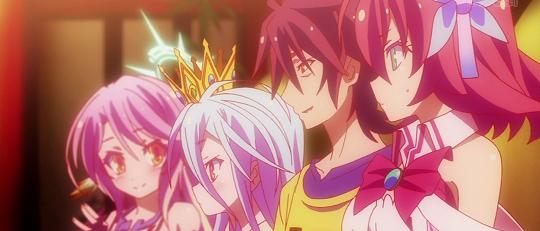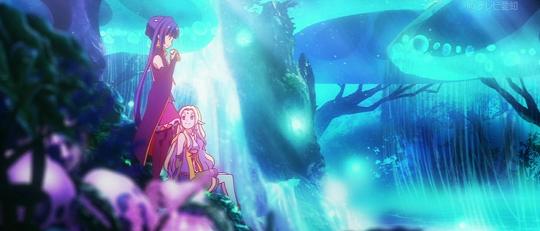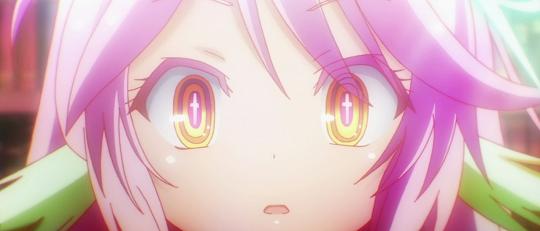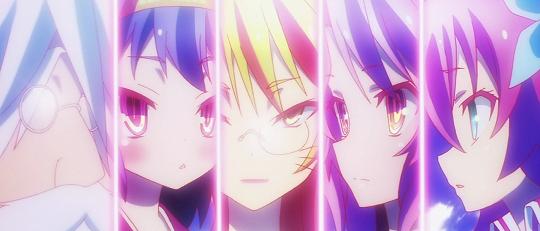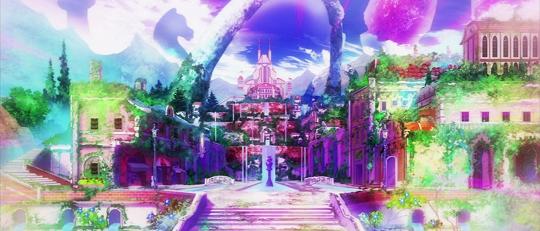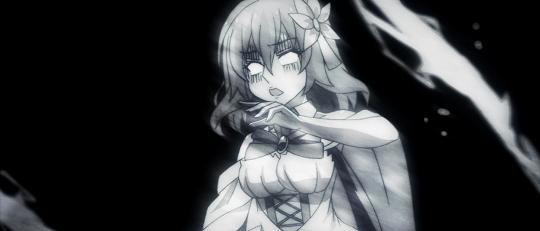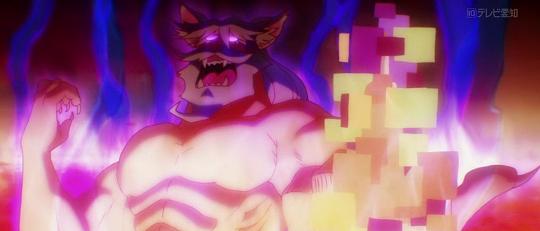There’s a fundamental problem with No Game No Life in that when the series isn’t revelling in the games that form the core of its mythos, it’s chronically dull. Like a lot of series this doesn’t become apparent until well into its run and for NGNL it’s the shift away from minute-to-minute, seat-of-your-pants gaming pugilism towards the “long game” that starts being played.
Rewind though. Young man and even younger girl get transported to a fantasy realm of elves and angels where every conflict is resolved with a game. These games cover the spectrum from cards to chess to video games and are governed by a set of rules outlined by the whimsical child-like deity Tet. As I mentioned in my Mondaiji-tachi review, it’s a well realised world that takes its core conceit to its logical extreme: nothing is contested without a game. This obviously puts our heroes, Sora and Shiro, at the top of the pile because of their impossibly prodigious game playing abilities.
It starts innocently enough with rock-paper-scissors, blackjack and frivolous games of “chance” then escalates upwards until it’s bending the fabric of reality or plugging directly into virtual worlds, all for equally increasing stakes - the fate of entire race anyone? It’s certainly impressive how the simpler games are gussied up but unfortunately the underlying structure becomes apparent all too quickly: Sora and Shiro - or “Null” as they’re known together - never lose. There are hiccups along the way but you know that if the wager is high enough they’ll pull through and they’ll do it with enough self-knowing swagger and pomposity to make it seem like it was all planned. Which is exactly what the series wants us to believe: that these two wunderkinds are intelligent and well-learned enough to conquer any game that is thrown at them and are scheming days, weeks, years ahead of everyone else. It’s the boardgame equivalent of Kenishiro from Fist of the North Star: you’ve already lost!
When it comes to the smaller games that concept doesn’t require a lot of buy-in, you’re too wrapped up in the gorgeous, kaleidoscopic presentation or the surprisingly deft comic timing. When they’re playing entire games of Othello in their heads or plotting where an aggressive and unpredictable enemy will be hours in advance, their confidence and grandstanding rings a little hollow. In a way it feels a lot like a detective serial where the lead isn’t so much investigating but going through the motions. The analogy is especially pertinent as like fictional detectives, Sora and Shiro take great pleasure in extolling the minutiae of their strategies to a dumbfounded audience, grinding what was a high-tension, fast changing contest to an effective halt.
That’s when it’s not pitching Shiro, a canonically eleven year old girl as a sex object with copious flashes of underwear and you’ve only just wiped the suds from your eyes before, yes, another bath scene comes along. It’s a shame because it taints the relationship between her and Sora from closely familial, given their circumstances, to worrisomely intimate. That’s a grain of sand though in comparison to the desert of aspersions cast towards Stephanie, the once future ruler of humanity in this high-fantasy world. Derided and treated like a literal dog (ears, leash and all), Steph is enthralled to Sora from early on and right through to the twelfth and final episode she is treated as a punchline and a punching bag in equal measure. Made even more disquieting by Sora and Shiro constantly lording their intellectual superiority over her.
It’s a black mark against what is otherwise a hyperactive but phenomenally fun series, especially when you have characters like Jibril who flips between terrifying power and salivating capriciousness with hilarious regularity. Perhaps it’s best to forget that Sora and Shiro are supposed to be hikkikomori despite demonstrating impressive adaptability and social abilities, just file that away along with question as to why neither of them show any concern for their home planet/dimension. And why the “werebeast” kingdom have access to the technology and knowledge they do. Or why Sora and Shiro extol the virtues of having a good game, even if you lose, yet never lose themselves.
They’re questions that are left unanswered at the end of the series after a rather lackluster climactic battle that, bizarrely enough, is preceded by an idol-esque intro sequence. But they’re points that can be overlooked if you find the rest of the series - the constant pop culture references, the science-lite games of the first half, the disconcerting subversion of the ending theme, the deadpan delivery of Shiro - agreeable. As a whole No Game No Life balances out to a positive. For all the disconcerting treatment of certain characters and a lack of interesting interactions outside of the games, it can be whip smart, laugh-out-loud timely and eye-boggling pretty when it wants to be. Not an unmitigated success by any measure but with over two-thirds of the sixteen races of the world still to be revealed and the final face-off against Tet on the cards, I had a great time with what was presented here but, perhaps more tellingly, I am looking forward to any further entries this series may have.
